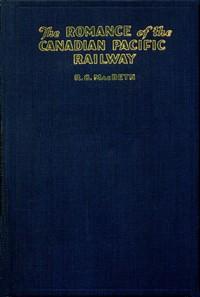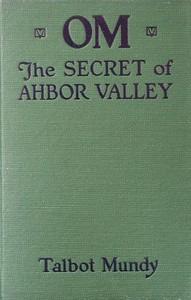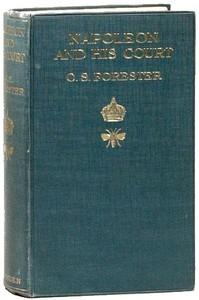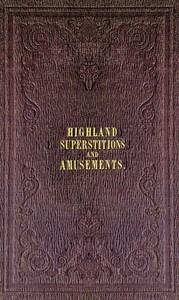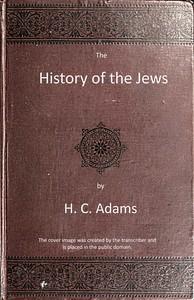|
|
Read this ebook for free! No credit card needed, absolutely nothing to pay.Words: 68095 in 8 pages
This is an ebook sharing website. You can read the uploaded ebooks for free here. No credit cards needed, nothing to pay. If you want to own a digital copy of the ebook, or want to read offline with your favorite ebook-reader, then you can choose to buy and download the ebook.

: The romance of the Canadian Pacific Railway by MacBeth R G Roderick George - Canadian Pacific Railway Company@FreeBooksThu 08 Jun, 2023 les that the undertaking was looked on by some as the very climax of engineering impossibility. Now that the smoke of battle has cleared away and that both Confederation and the Railway are running smoothly, we can look back and see the giants who fought victoriously to create the conditions we now enjoy. Some of these great men did not live to see the realization of their dreams, but they died in the faith that their dreams were so good that they would come true some time. Like the gallant soldiers of all time, they fell, still gripping the sword-hilt and cheering their comrades on to victory. Let us be grateful enough to halt for a moment with bowed heads and lay a wreath of memory on their honoured graves. Peace hath her victories no less renowned than war, and Canada must not forget her heroes in either. There were several causes operating, midway in the last century, to lead the older Canada of Ontario and Quebec, and also the Maritime areas of New Brunswick, Nova Scotia and Prince Edward Island, to consider the advisability of federating together for the good of the whole. The commercial power of the United States had such a magnetic pull upon some of the provinces that the tie which held these Provinces to Britain was being subjected to some strain. Moreover, the Imperial Government noticed with some anxiety that political prejudices and feeling between the various parts of the British possessions made any concerted plan for military action difficult to accomplish. Accordingly, as it is now known and can now be told, Lord Monck, who was the Governor-General in the "sixties," quietly used some pressure to keep Confederation before the minds of public men in the various parts of the country. Besides all that, there was very considerable difficulty in carrying on government in the Canada of Ontario and Quebec, owing to racial differences and double leadership, which meant an almost constant danger of legislative deadlock. Moreover, the British possessions from the St. Lawrence to the Pacific were like a dumbbell, big at the ends and weak in the middle, as a Westerner once said. There were the immense areas of older Canada and the still more immense areas west of Lake Superior--but the North Shore of that inland sea was a wilderness of unproductive rock where no link of settlement would seem possible. Hence, as the aforesaid Westerner expressed it, "Canada would break off in the middle unless we linked it up with the steel trail." There was much truth in that statement in those early days and highly important truth it was. Many, in our day, cannot realize how swiftly inter-travel and inter-trade over the pioneer railway across Canada brought the East and the West together. "No pent-up Utica confines our powers The vast, boundless continent is ours." After some discussion, the Charlottetown Conference adjourned to meet as a larger gathering in Quebec City on October 10th, 1864--a red-letter day not only in the history of Canada, but of the British Empire and the world. The object of the Quebec Conference was as stated above; and therefore there were men there from all the then organized British Provinces. These were men who could have filled places in the "Mother of Parliaments" at the world's metropolis, but who at the Quebec meeting were engaged in the, perhaps, more difficult undertaking of bringing into being, out of diverse elements, a new nation within the Empire. These men were "The Fathers of Confederation," and the famous picture of that conference should be in every Canadian home. Etienne P. Tache, who once said that the last gun fired in North America for British connection would be fired by a French-Canadian, was chairman. From Ontario and Quebec came John A. Macdonald, George Brown, George E. Cartier, A. T. Galt, William McDougall, Thomas D'Arcy McGee, Oliver Mowat, Alexander Campbell, James Cockburn, Hector L. Langevin, and Jean C. Chapais. From Nova Scotia there were Charles Tupper, W. A. Henry, Jonathan McCully and R. B. Dickey. From New Brunswick came Samuel L. Tilley, John M. Johnston, Charles Fisher, Peter Mitchell, E. B. Chandler, W. H. Steeves and John H. Gray; Prince Edward Island was represented by Colonel Gray, Edward Palmer, W. H. Pope, George Coles, Edward Whalen, T. H. Haviland and A. A. Macdonald. Newfoundland sent F. B. T. Carter and Ambrose Shea, though it was not yet to come into Confederation. It is not our purpose, in the present writing, to dwell on this great meeting beyond saying that it led to the Confederation of Ontario, Quebec, Nova Scotia and New Brunswick in 1867. Prince Edward Island entered in 1873 and the Western prairie country and British Columbia in 1870 and 1871. The two latter entered with somewhat reluctant feet; Manitoba, retarded by Louis Riel's stand against the incoming of Canada lest the rights of the natives should be ignored; and British Columbia, unready to come in unless the railway across the continent to the Pacific Coast was guaranteed within a given time. These difficulties were finally overcome, but the details do not belong to this story. Suffice it to say that Confederation being accomplished, the new sense of national unity led to combination in the immense undertaking of a railway from sea to sea. The courageous facing of such an enormous task had no precedent in the business history of the modern world. The big Republic to the South of us has done some amazing things, such as the Panama Canal in recent years, but even that commercially daring country only attempted a transcontinental railway when it had nearly forty millions of people. Canada undertook the task when her population was less than four millions. To the onlooking world the attempt must have appeared like "a forlorn hope"--a sort of a "Charge of the Light Brigade" against batteries bristling with obstacles of a wholly unprecedented kind. But there are always some men who are unafraid, and the dream of seers was to be realized. Once Confederation had been accomplished, a transcontinental railway became a national necessity. This was true not only from the standpoint of politics and trade, but from the standpoint also of law and order in the far-flung country. It will be remembered that Louis Riel started a revolt against the incoming of Canadian authority in 1869, and that he held high carnival in the West till Colonel Garnet Wolseley and his soldiers reached Fort Garry from the East, nearly a year after the Riel outbreak started. All this period was not consumed in travel; but it had taken three months' steady travel overland, after mobilization in the East, before Wolseley reached the scene of Riel's revolt. The whole Western country might have been swept by the rebel chief's revolt in that time, and the necessity of swifter communication between the different parts of Canada became painfully apparent. And so, when British Columbia came into Confederation in 1871, there was an understanding that the railway from the East to the Pacific should begin in two years and be finished in ten. This daring pledge was given by Sir John A. Macdonald and his Government at Ottawa, despite the fact that a distinguished explorer and engineer, Capt. Palliser, sent out by the Imperial Government, had reported after four years on the ground, that on account of the mountains being impassable, a transcontinental railway could not be built from sea to sea on British territory. But Sir John Macdonald went ahead and sought to interest some big business men who might form a company to build the Canadian Pacific to the Western sea. At that time Sir Hugh Allan, head of the Allan line of steamships, was probably the most able and prominent business man in Canada. He was not only interested in steamships on the Atlantic, but had acquired railway interests as well. There is no doubt that Sir Hugh Allan had been pressing upon men in public life the project of a transcontinental railway, which he might lead in building, with the further idea, no doubt, of having another line of steamers on the Pacific. This was a worthy enough ambition for a great Canadian. There is no reason to think that Sir Hugh Allan was mercenary or avaricious, for he had no need of more wealth than he possessed. In any case he, being of the same political party as Sir John Macdonald, as well as a man of great ability and financial power, was one of those in line as a possibility for such a big task. Accordingly Allan formed a company to build the railway. So also did Mr. D. L. Macpherson and a group of Toronto capitalists, who alleged that Allan was in league with American interests in a degree that would militate against the success of the Canadian Pacific as a Canadian road. Sir John Macdonald tried in vain to get these two projected companies to amalgamate. Finally it seemed to be settled that a new company should be formed of Canadians and that Allan would have control. He was spending money with a lavish hand and when the Dominion election was held in 1872 he furnished the large sum of 0,000 for campaign funds to Macdonald, Cartier and Langevin. It is known that Allan had always contributed to the campaign funds of the party, as others did, but the fact that these campaign funds in 1872 were contributed at a time when a huge contract was pending, made the whole transaction look dangerous. All campaign funds are legally and morally wrong, and the fact that they were customary and that everybody knows they are customary, does not make them right. In this particular case, Cartier, who was then mentally as well as physically broken down, and who, contrary to Macdonald's advice, ran for an impossible constituency, where he was defeated, seems to have made the largest demands on Allan. It seems clear also that Cartier held out to Allan, hopes of the contract. But it is also clear that the other leaders got certain sums which they used in the campaign. The Macdonald government was elected. After the election a new company, called the Canadian Pacific, was formed, with representative men from all the Provinces as directors. That new board chose Allan as President, it is said, without any pressure from the Government. This is not unlikely, as Allan was, as we have said, the biggest business man in Canada at the time. To this company the Government granted a charter to build the Canadian Pacific, but American interests were to be excluded as the Government insisted. Allan agreed to this and repaid the money the Americans had advanced. The New York men, of course, were annoyed at this and gave the opponents of the Macdonald Government some hints as to those campaign funds from Allan. Then Allan's personal correspondence with American interests during the election year was stolen by a clerk in the office of Allan's solicitor, Mr. J. J. C. Abbott, and, being made public, raised a tremendous political storm. When the House of Commons met the atmosphere was tense and electric. Only a few days elapsed before Mr. L. S. Huntingdon, for the Opposition, moved for the investigation of the charges that were floating around in regard to these campaign funds, the suggestion being that Sir Hugh Allan got the railway contract in return for his monetary contributions. On an immediate vote the Government was sustained, but there was an uneasy feeling abroad and men of independent mould were breaking away from party ties. Sir John Macdonald, who saw the situation with his usual political sagacity, himself moved for the appointment of an investigating commission, and the House adjourned till that commission would be ready to report. When the House met in October, 1873, the Hon. Alexander Mackenzie, leader of the Opposition, moved a vote of non-confidence and supported it by quoting from the report of the commission. The debate in the House was hot. Charles Tupper, the "war horse of Cumberland"--a masterful debater, who later was the tremendous drive wheel of the railway project--supported the Government, but Huntingdon replied that the Government had kept itself in power by the lavish use of money from men who were desiring contracts. Sir John A. Macdonald spoke for nearly five hours in defence of his action, dealing with the whole history of the Canadian Pacific Railway. He made a special appeal for support in order that East and West might be connected by rail and the whole of Canada developed. Sir John, though at no stage of his career a great orator, was possessed of a magnetic manner and could coin phrases that had indescribable force. Such, for instance, was the expression he used once at a great mass meeting in Toronto, when he said dramatically, "A British subject I was born--a British subject I will die." On this occasion, in 1873, in the House, when he made explanation of his policy in regard to the railway contract, he closed his five hours' address in the words: "But, Sir, I commit myself, the Government commits itself, to the hands of this House; and far beyond this House, it commits itself to the country at large. We have faithfully done our duty. We have fought the battle of Confederation. We have fought the battle of unity. We have had party strife, setting Province against Province. And more than all, we have had, in the greatest Province, every prejudice and sectional feeling that could be arrayed against us. I throw myself on this House; I throw myself on this country; I throw myself on posterity, and I believe that, notwithstanding the many failings of my life, I shall have the voice of this country rallying around me. And, Sir, if I am mistaken in that, I can confidently appeal to a higher court--to the court of my own conscience, and to the court of posterity. I leave it to this House with the utmost confidence. I am equal to either fortune. I can see past the decision of this House, either for or against me, but, whether it be for or against me, I know, and it is no vain boast of me to say so, for even my enemies will admit that I am no boaster--that there does not exist in Canada a man who has given more of his time, more of his heart, more of his wealth, or more of his intellect and power, such as they may be, for the good of this Dominion of Canada." This speech was listened to by a full house and crowded galleries, amongst those present being Lord Roseberry, then on a visit to Canada. Sir John closed his speech about two o'clock in the morning, and the Hon. Edward Blake rose to reply. Blake was probably the ablest and most massively intellectual man that Canada has produced. He lacked the magnetism of Sir John, but had the power, almost to a fault, of dealing with a subject in such detail that when he was through with it there was little left to be said. Mr. Blake was at that time quite sceptical as to the practicability of a transcontinental railway, anyway; but that night in the House of Commons he concentrated his tremendous argumentative oratory against the Government for having, as he alleged, won the election with campaign funds from interested parties. There was doubt as to the result in the House till some of the independent members who might ordinarily have supported the Government began to indicate otherwise. Curiously enough, Mr. Donald A. Smith , the man who, later on, drove the last spike in the Canadian Pacific Railway, under the Premiership of this same Sir John Macdonald, in 1885, was the member who really dealt the Government its knockout blow in 1873 in the House of Commons. No one knew what the course of Mr. Smith, who was never a party man, would be, and when he rose to speak every one listened with strained attention. His opening words seemed to favour the Government, but he was simply absolving Sir John Macdonald from personal blame. Here is the report of what Mr. Smith said: "With respect to the transaction between the Government and Sir Hugh Allan, I do not consider that the First Minister took the money with any corrupt motive. I feel that the leader of the Government is incapable of taking money from Sir Hugh Allen for corrupt purposes. I would be most willing to vote confidence in the Government , if I could do so conscientiously . It is with very great regret that I cannot do so. For the honour of the country, no Government should exist that has a shadow of suspicion resting on them, and for that reason I could not support them." In the afternoon of that day, November 5th, 1873, Sir John A. Macdonald informed the House that he had placed his resignation in the hands of the Governor-General and that the Hon. Alexander Mackenzie was called upon to form a new administration. Free books android app tbrJar TBR JAR Read Free books online gutenberg More posts by @FreeBooks
: Om: The secret of Ahbor Valley by Mundy Talbot Lester Leonard Illustrator - India Fiction; Adventure stories@FreeBooksThu 08 Jun, 2023

: Napoleon and his court by Forester C S Cecil Scott - Napoleon I Emperor of the French 1769-1821 Friends and associates; France Court and courtiers History 19th century; Napoleon I Emperor of the French 1769-1821 Relations with courts and courtiers@FreeBooksThu 08 Jun, 2023
|
Terms of Use Stock Market News! © gutenberg.org.in2025 All Rights reserved.

